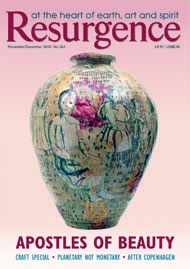In spite of all the public scrutiny of his private life, Ted Hughes succeeded in safeguarding an essential privacy. At the same time he was very generous in discussing or corresponding about the formative experience that was the background to his work. That Keith Sagar was engaged with Hughes in such a correspondence for nearly 30 years, and in such detail, is a measure of Hughes’ trust and of how constructive and fortifying he found their exchange.
Sagar’s new book is the ultimate flowering of this trust. On the face of it he achieves a critical study of the lifelong development of Hughes’ work, tracing his “painful journey from terror in the face of Nature in his first three collections, through the transitional works from Crow to Cave Birds, to the transformation in Moortown and Remains of Elmet, culminating in the exultation of River”. But Sagar’s writing takes us deeper.
In alchemical terms here is the solution – the moment of melting when what was arrested or frozen becomes fluid – when finally it is possible, even for the man in the stricture of his maleness, to let go into feeling, to dissolve into tears. As Sagar puts it, “By River water has become the sacred, healing element”. Or in Hughes’ own words, “The water of feeling, and of heartfelt utterance”. And dare one guess that this arrival was what life required if that mage-heart were ever to complete its quest, able to frame the Parzival-style redemptive question, “What ails thee?” in his final collection of poems, Birthday Letters?
The authority Sagar is able to draw on allows him to overhaul what has tended to be a fixed view of Hughes as the grim, almost demonic author of the early work, and consequently of the turmoil and tragedy of his private life. But, for another reason, Sagar’s book is important and timely.
Hughes’ immense work Shakespeare and the Goddess of Complete Being explores how the micromesh of Shakespeare’s operational psyche registers in full the formative crisis affecting the contemporary collective consciousness, and which was being expressed in the Puritan/Catholic (Logos/Eros) division; and how Shakespeare takes that crisis into himself where his own driven need for integration seeks to bring to consciousness some workable resolution (though it’s my guess that finally, in The Tempest, he abandons the search and settles for a fix that merely seals the split, severing this supply line from the imagination and thus bringing his writing to an end).
Becoming the incarnation of a dilemma in the collective psyche, taking it into the individual human heart and fully suffering it, and thereby ‘journeying’ it to conscious resolution, is the way of the shaman. In this the imagination is involved, which is why for the genuine poet such driven undertaking to heal the divided self becomes the magical or cult act whereby the shamanic role is achieved.
Sagar succeeds in revealing Ted Hughes in such a light, and as commanding a range of intelligence and capacity for inquiry as extensive as that of Shakespeare himself. He shows, too, how in both, the towering shamanic potential is founded in down-to-earth, susceptible (which may imply errant) humanity.
Why this is so raw and immediate to readers steeped in Resurgence’s own wrestle with prevailing consciousness is because in their separate ways the same questioning is taking place, and the same conclusions emerging: the need to reconnect with Nature, the feminine and the sacred. For a magazine that sets itself “at the heart of Earth, art and spirit” this is a significant resonance. And at a time (probably like every other time) when so much of what passes for poetry is marginal, anecdotal and posturing, to serve witness of a major poet in all-exacting bardic office is… important.
As for Keith Sagar’s book, I can’t really see how anyone could find his or her way through the 1,300 pages of Hughes’ Collected Poems without it.
This book is available from www.fast-print.net A DVD of Ted Hughes in conversation with Leonard Baskin is available at www.artistandpoet.co.uk






